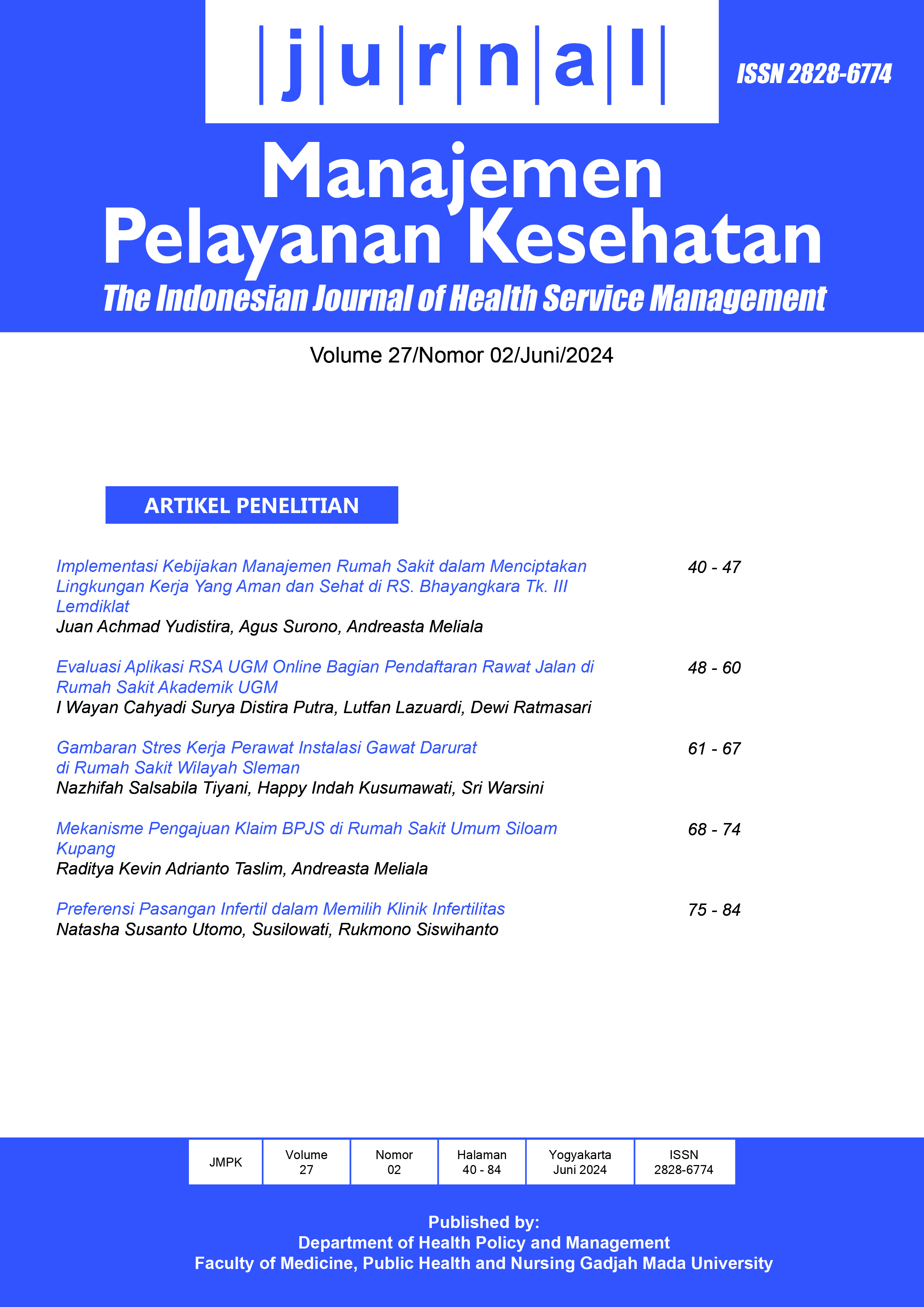PREFERENSI PASANGAN INFERTIL DALAM MEMILIH KLINIK INFERTILITAS
INFERTILE COUPLES’ PREFERENCES IN CHOOSING AN INFERTILITY CLINIC
Abstract
Background: There has been increasing need for access to infertility care in Indonesia, leading several hospitals to establish infertility centers. RS Permata Hati Metro opened it’s infertility clinic to improve access and quality of infertility services. As competition grows with other hospitals also providing infertility sevices, it is crucial for RS Permata Hati Metro to understand the preferences of infertile couple to tailor their marketing startegies effectively.
Objectives: To identify the preferences of infertile couples at the RS Permata Hati Metro Infertility Clinic regaring desired infertility services.
Methods: This observational analytic study used a cross-sectional design and conjoint analysis. The sampel consisted of infertile couples who visited the clinic from April 2022 to April 2023.
Results: Success rate were identified as the most critical attribute in the decision-making process of infertile couples, at 46.64%, followed by the completeness of examination and treatment facilities (17.83%), the experience of the attending doctor (13.75%), service cost (12.78%), and the recommender (9%). Positive utility values indicated that recommendations from friends or family (0.014), the experience of specialist doctor who are fertility consultants (0.361), comprehensive examination facilities (0.361), higher success rates (1.011), and lower service costs (0.240). There was no significant difference in the order of attribute importance and utility values between wives and husbands.
Conclusions: A combination of attributes such as recommendations from friend or family, specialist doctors who are fertility consultants, comprehensive examination facilities, higher success rates, and lower service costs provide the most positive influence on infertile couples in choosing an infertility clinic.
References
2. WHO. International Classification of Diseases, 11th Revision (ICD-11). Geneva.
3. Bennett LR, Wiweko B, Hinting A, et al. Indonesian infertility patients’ health seeking behaviour and patterns of access to biomedical infertility care: An interviewer administered survey conducted in three clinics. Reproductive Health; 9. Epub ahead of print 2012. DOI: 10.1186/1742-4755-9-24.
4. Bennett LR, Wiweko B, Bell L, et al. Reproductive knowledge and patient education needs among Indonesian women infertility patients attending three fertility clinics. Patient Educ Couns 2015; 98: 364–369.
5. Samsulhadi. Improving Access and Quality of IVF Services in Indonesia. Congress of Asian Society for Fertility Preservation.
6. Hariyani A. ANALISIS PROSES PENGAMBILAN KEPUTUSAN KONSUMEN UNTUK MENGIKUTI DAN MEMILIH RUMAH SAKIT ATAU KLINIK UNTUK MELAKUKAN PROGRAM BAYI TABUNG. UNIVERSITAS GADJAH MADA, 2018.
7. Visnu J. IDENTIFIKASI PREFERENSI KLIEN MENGGUNAKAN ANALISIS KONJOIN DI DIVISI ESTETIKA KLINIK INTAN – YOGYAKARTA. Universitas Gadjah Mada, 2017.
8. Ryan M. A role for conjoint analysis in technology assessment in health care? Int J Technol Assess Health Care 1999; 15: 443–457.
9. Ryan M, Farrar S. Using Conjoint Analysis to Elicit Preferences for Health Care. BMJ 2000; 320: 1530–1533.
10. Indrawan R, Yaniawati P. METODOLOGI PENELITIAN Kuantitatif, Kualitatif, dan Campuran untuk Manajemen, Pembangunan, dan Pendidikan. Bandung: PT. Refika Aditama, 2014.
11. de Bekker-Grob EW, Donkers B, Jonker MF, et al. Sample Size Requirements for Discrete-Choice Experiments in Healthcare: a Practical Guide. Patient 2015; 8: 373–384.
12. Palumbo A, De La Fuente P, RodrÍguez M, et al. Willingness to pay and conjoint analysis to determine womens preferences for ovarian stimulating hormones in the treatment of infertility in Spain. Human Reproduction 2011; 26: 1790–1798.
13. Botha W, Donnolley N, Shanahan M, et al. Societal preferences for fertility treatment in Australia: a stated preference discrete choice experiment. J Med Econ 2019; 22: 95–107.
14. Shandley LM, Hipp HS, Anderson-Bialis J, et al. Patient-centered care: factors associated with reporting a positive experience at United States fertility clinics. Fertil Steril 2020; 113: 797–810.
15. Jensen JR, Stewart EA. Mayo Clinic Guide to Fertility and Conception. Da Capo Lifelong Books, 2015.
16. Ryan M. USING CONSUMER PREFERENCES IN HEALTH CARE DECISION MAKING The application of conjoint analysis. 1996.
17. Haryani A. Analisis Proses Pengambilan Keputusan Konsumen Untuk Mengikuti dan Memilih Rumah Sakit atau Klinik untuk Melakukan Program Bayi Tabung. 2018.
18. Lewis CL, Wickstrom GC, Kolar MM, et al. Patient Preferences for Care by General Internists and Specialists in the Ambulatory Setting. 2000.
19. Sumarwan U. Perilaku Konsumen : Teori dan Penerapannya Dalam Pemasaran. Jakarta: PT. Ghalia Indonesia, 2011.
Copyright (c) 2024 Natasha Susanto Utomo

This work is licensed under a Creative Commons Attribution-NonCommercial-ShareAlike 4.0 International License.




